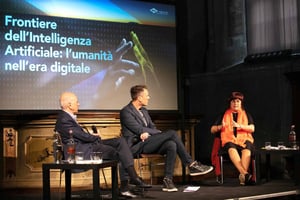What can we expect from the ever expanding and unstoppable development of Artificial Intelligence? In order to try to describe a possible future for humanity, two leading experts met at the Museum of Science and Technology of Milan, namely Michele Di Francesco (Scuola Superiore IUSS of Pavia) and Barbara Henry (Scuola Superiore Sant’Anna of Pisa).
The workshop that followed was full of insights and indications, and the multiple questions raised during the debate were all linked to hopes and fears about Artificial Intelligence: are we achieving freedom from work or are we making ourselves futile? Are we heading towards a post-anthropogenic era? And even: will we ever manage to fuse the world of emotions with that of machines?
We do not have a firm answer to these questions, but they outline new perspectives.
According to Michele Di Francesco, “Machines in their pure state, are not a danger. It depends on what we want and what we teach, not on what machines want”; whereas Barbara Henry emphasized how, “the word robot comes from Czech and refers to work and to being freed from work. The future of work is a problem to be dealt with politically”.
Both then stated that “we are becoming more and more dependent on machines that we know less and less” and that we need to fight the educational idea that the fragmentation of knowledge is to be encouraged. In the opinion of Michele Di Francesco, “Science is not a set of recipes: it is a way of seeing the world”; whereas Barbara Henry points out that; “Science is not in a ‘non-place’: science has always been created in society”.
Below is a summary of their speeches.
———————————————————-
Michele Di Francesco: “Human minds and artificial minds”.
Autonomy, general, ability to learn: this is the definition that we can give to Artificial Intelligence.
The comparison between human minds and artificial minds starts with a question: are our minds from the Pleistocene era trapped in the technological environment of the twenty-first century? My response is that we do come from the Pleistocene era, but we are supported by the cognitive environments that constantly surround us. There has never been only a human mind: we have always been able to speak about intelligence technology. Our world is punctuated by technology, it is enough to think of the invention of the printing press, and writing before that: it enabled us to not have to memorize huge quantities of ideas, going well beyond the limits of our brain. This loss of our biological memory is accompanied by the possibility of acquiring a quantity of information about the world that was impossible before, and passing it on to the next generations.
When we look at the subject of Artificial Intelligence we can refer to two major hypotheses: the computational mind and the extended mind.
The former follows the Touring model, according to which it is possible to build material structures that are capable of calculating. According to this vision, ‘the mind is the software that goes round in our brain, and possessing a mind is therefore the equivalent of possessing a device for processing information’.
Cognitive processes are the result of the manipulation of internal mental representations, which mediate between perceptive input and behavioral output. This metaphor is true, but is not to be taken literally. In fact, our corporeity determines our thinking. Over time we have lost some of our biological memory skills, but we have gained in knowledge tools/supports.
The model of the extended mind follows externalist epistemology (investigation of the structure and methods of science), according to which reason needs a physical body and cannot be isolated only in the brain, it must take into account what has been built in the world, or communication technology.
It is certain that our minds are less and less in our heads: we have made the world intelligent, but our head has been freed and relieved from thinking. What is new is that we are building tools that go ahead by themselves, without us and with a high level of autonomy. But in the end will there not be an imbalance between this intelligent environment and us?
———————————————————-
Barbara Henry: “Dematerialization and corporeity in robotics and contemporary roboethics”.
We live immersed in a mixed, hybrid dimension, in which we are connected to artificial intelligence. These beings, the Cyborgs, “the non-dead and those not born of woman” (according to the definition of the visionary engineer Vincenzo Tagliasco) are challenging us from an ethical point of view.
The reality surrounding us, the films that we watch, continuously pose serious questions that touch on the subjects of ethics and roboethics (namely the discipline that regulates the relationships between robots and human beings). Robots form part of a future that is already present. But what are the rules of conduct that force us to rethink the relationship between humans and non-humans?
Let’s start with a vital consideration: there is nothing more human that the will to survive and the will to live with dignity. And so, paraphrasing Kant, we must treat robots like ends and not means, aware that we are moving towards a post-human future.
This is an idea that opens up a new dimension of ethical learning. It is a critical skill that originates from an ongoing moral process: we are still far from having reached this level. We can refer to the ancient roots of a present future. Post-humanism is represented by a past that enables us to understand the present and the future, as demonstrated by a technologically-evolved society like Japan, where scientific and technical knowledge live alongside one another and hybridize, constantly fusing with Shintoism (a polytheistic ancient religion) and other forms of non-rational knowledge.
Let’s avoid falling into determinism: the future has not been written, but it is to be written.

